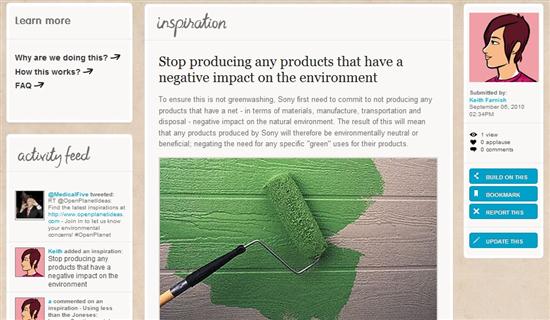
Fashion! Turn to the left
Fashion! Turn to the right
Oooh, fashion!
We are the goon squad
and we’re coming to town
(“Fashion”, David Bowie)
The Unsuitablog is being fashionably late in publishing the latest Monthly Undermining Task; the main reason being that I wanted leave the previous one up as long as I possibly could, particularly in light of an article by Javier Sethness, which included the following phrase that I couldn’t possibly disagree with:
“Just as the hegemonic system McKibben mystifies—capitalism—must be dislodged and abolished, so must McKibben himself come to be displaced as leader/father of contemporary movements against climate catastrophe.”
So there you go – it’s nice not to be alone.
This month (I’m skipping into the next month too, as this is so important) we are targeting something that should be the antithesis of every environmental group, and environmental activist on Earth – but it’s not and, in many cases, is embraced by so-called environmentalists for the very reason given in the above quote. Fashion is the artificially generated desire for change. Note the word “artificial”: as humans we do, to a certain extent, desire change in order to achieve fulfilment; but only in civilised society are we bound to the idea that we should change constantly, driven by a system that ensures we are never fulfilled.
Fashion exists to keep humans in a state of psychological flux: malcontents always looking for the next thing to desire. What is especially evident in the destructive monster called Industrial Civilization is that the idea of fashion is increasingly becoming the driving force behind economic growth. Where once it was enough for industry to ensure that everyone had what most people in the industrial world would consider to be basic goods, such as a shoes, a warm coat, a television and a refrigerator; the saturation of the Western economies with such “basic” goods, along with ever-shrinking profit margins (only partly supplemented by using slave labour) means that baseline consumption has to be augmented by a constant desire for different versions of the same thing.
Once you have a computer, you don’t need another one for a long, long time; unless companies bring out software that is constantly “upgraded” to ensure that at some point you will have to buy new hardware in order to run the new software. You don’t need the upgraded software, but you are sold it in a very convincing way – to such an extent that it becomes highly desirable. At some point you feel that you do need the new software; and in order to run the new software you need to upgrade your hardware. Of course, you might be given the desire to change your hardware before you “need” to, for instance to take advantage of faster performance you never realised you needed.
Remarkably, this is only a simplified version of the full story – leaving out built in obsolescence and withdrawal of support – such is the nature of computing. More transparently, but in essentially the same way, are we given the desire for new clothing and footwear; new ways of listening to and watching things; new ways to communicate; even new ways to read books – by doing away with the books themselves. The superficial driver may be practical: personal betterment, convenience, speed, scale; but beneath all of this, including the computer example, is the idea that someone, somewhere has something you have not got, and which you have become in need of.
Fashion cannot exist without this “need”. The industrial economy, increasingly, cannot exist without fashion.
Of course, once you have the thing which you desire (or rather, “need”) then a new desire has to be created. The incremental “upgrade” – be it to a different colour or style of coat, or a more convenient way of recording television shows – is readily attainable providing you are prepared to spend the money, and ideally take out a loan; and if the upgrades are just significant enough, and just affordable enough, then you will never realise that what you desire is actually completely unattainable. It must be, otherwise consumption would eventually stop.
The iPhone 3 became unfashionable immediately upon the release of the iPhone 4. There was no need for anyone to buy an iPhone 4 if they already had an iPhone 3; but very many people were persuaded in contradiction of such an obvious point. There will be an iPhone 5 soon.
So, how is this desire for the unattainable maintained in a society where we are, apparently, so market-savvy and educated? I’ve given one of the key reasons away: the idea that the unattainable is seen to be attainable. I’ve also hinted at a deeper psychological trick: the personalisation of desire, by which a “need” that is external to the individual, eventually becomes internalised, and thus what is perceived to be a genuine need. This is nothing short of psychological manipulation; and it is one of the most powerful forces existing in modern society.
The methods by which these two con-tricks are pulled off are many and varied, and you will probably be familiar with the vast majority of them.
A very powerful – possibly the most powerful – method by which fashion is imposed upon people is social peer pressure. The idea that someone important, and possibly influential, to you has something you do not have is more than enough to create personal “need”. This factor is heavily exploited by industry, most obviously in the form of advertising that suggests collective desire (notice the number of adverts that use happy crowd or friend scenes), but increasingly through virtual social networks such as Facebook, and direct viral networking.
More subtly, but on a larger scale, is the use of targeted media such as technology and clothing magazines (who will readily promote product x in exchange for advertising revenue) along with newspaper supplements, that show new products as being “essential” or at least highly desirable. Far more cheaply, as far as industry is concerned is the blanket press release to kneejerk bloggers, desperate to be the first to report on the latest big thing – well, big in terms of potential income – and extremely willing to publish these press releases verbatim.
At a more formal level, but clearly in response to the corporate desire for continued economic growth (profit), is the relentless push by civilised governments for continual consumer spending. This can manifest itself in political speeches that ask citizens to support industry and maintain a “healthy” (ironic, considering it is destroying the global ecosystem) economy; and even government policy that may give tax breaks for consumer spending – providing that spending is on new products and, ideally, the very latest of everything. On the surface this may be suggested as promoting “eco friendly” products, when it is actually ensuring we keep the economic machine grinding on.
Incredibly, despite our knowledge of these methods, we all – at some time or another – fall for them. We fall for them because they exploit some of the most primal aspects of humanity: the need to be wanted and loved; the desire to belong; the willingness to follow strong leadership. It may just seem like a small word – fashion – but it encompasses a Pandora’s Box of manipulative methods that exist in order to keep us buying, and thus allowing the ravenous industrial machine to keep eating up the very ecosystem we depend upon for our survival.
This can be stopped.
During 2010, I have detailed all sorts of methods for undermining different aspects of industrial civilization: from mind numbing television and behaviour altering advertising to life destroying debt and child enslaving school testing; from the civilised corruption of language to the all-embracing cash economy; from the addiction of mass tourism to the placatory, fake greenness of the mainstream environmental movement.
Contained within those articles, along with the three original Unsuitablog anti-greenwashing guides are literally hundreds of potential avenues for undermining a way of life that will lead to our ultimate demise. As London Fashion Week ramps up to a screaming crescendo, and the fashion world’s commercial clock makes us once again feel inadequate in a new season – one that wild nature has been happy to repeat in resplendent glory every year since humans first colonised seasonal lands – I am turning to my readers, and fellow Underminers, to say how you would undermine the system that turns artificial, unnecessary commercial change into something we feel we need to have.
How would you create a world of Unfashion?
Suggestions can be sent to news@unsuitablog.org, posted on the Anti-Greenwashing Action Facebook Group, or posted as comments below this article. All suggestions that have a decent chance or working, and are practical for ordinary people to do will be published here.
Away you go…
From DVD:
Anti-peer pressure: make sure you don’t perpetuate social peer pressure and act as the opposite dissenting voice for people you know. Move against the trends too, downsize and simplify rather than buy in to them.
Adbusting: consumer advertising does a huge amount to create the unhappiness in people to need constant change – consider ways to fight back against it (http://thesietch.org/mysietch/keith/2010/02/09/monthly-undermining-task-february-2010-time-to-break-the-ads/)
From LS:
For my part I opted out of the “fashion” game a long, long time ago. My solution embodies the principle of: Reduce, Reuse, Recycle. And that is pure poison for the fashion industry. I do the following
1. Buy the highest quality garments that I can find (which is increasingly difficult of course). Don’t buy clothing that is clearly rubbish, it just encourages the retailers to replace good quality clothing with more rubbish
2. Only wash clothing when it actually needs it (not just because your wore it yesterday) and dry it on a cloths line. Washing wears out clothing faster, especially if you tumble dry
3. Repair garments to increase their lifespan
4. “Retire” clothing to wear while working in the garden as it ages and becomes unsuitable for wearing in public
5. Wear garments until they can’t be repaired any more
6. Convert unwearable clothing into rags for use around the house
I have also stopped buying new clothing to a large degree. So much perfectly good clothing is available second hand that I can provide most of my needs (often in very high quality once expensive garments) just by browsing a few second hand stores.
From Knutty Knitter:
I don’t buy fashion either and my sister who loves fashion now makes her own and does lots of swap sessions with friends. As for computer stuff – if it isn’t open source I mostly don’t have it.
All my appliances including computers are old – my stereo system is 30 years plus! It works really well so why would I need a new one.
I will have to purchase a new oven because I don’t have one yet (the last one was left in the previous house as part of the fixtures). Thats a total of one new appliance every five years or so – am I annoying enough yet?
I do buy art supplies but I don’t look at ads for that – I just go with what I actually want. Anyhow I don’t watch tv unless its recorded so I can skip the ads, don’t buy magazines or papers and don’t accept junk mail so I never know whats hot anyway :)
My friends like me for who I am not what I possess and that is the way I’ve always been – just more so since I started seriously into green. Keeping up with the Joneses was always overrated anyhow :)
From Sarah:
We’re not green. We just live simply. We’ve never used a credit card, and only have a loan for schooling of debatable use and a house that we couldn’t afford otherwise.
We cloth diaper, using a plain Chinese Tri-fold and waterproof liner. We gift handmade stuff. We sell handmade, hard-wearing kitchen stuffs. We go for weeks on end buying only groceries. (I’ve heard of “Year of no stuff” people doing that, and thinking it was some great thing, but the Amish and the Mennonites in our area have been doing that forever.) For that matter, why not take a page out of the Amish handbook, and take some sort of pious pride out of being simpler than everyone you know?
Instead of shopping for relief of that marketing-induced guilt of not being worthy on our own merit, we try to spend the time making something. We’ve made bramble baskets, all sorts of kitchen and bathroom items, painted pots and vases, made up-cycled denim bags, re-buttoned dresses and coats, pillow forts with children, hats, scarfs, Renaissance Festival Gear, campfires, s’mores, pies, sheds, crackers, and baby slings (among others). The point was we found worth in developing ourselves (like ladies of accomplishment in the Jane Austen novels) rather than just celebrating how much money we could make at a job we hate to buy things we don’t think we could make ourselves because we’re too lazy or scared.
The big thing for us is that only one of us works outside of the home (by choice and a strong in-home childcare market in our area), giving us time to make things. And if it isn’t made by our hands, it isn’t cool or worthwhile.
Thanks for all these so far.










